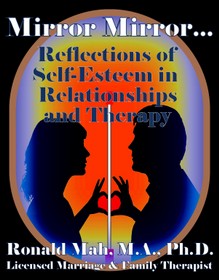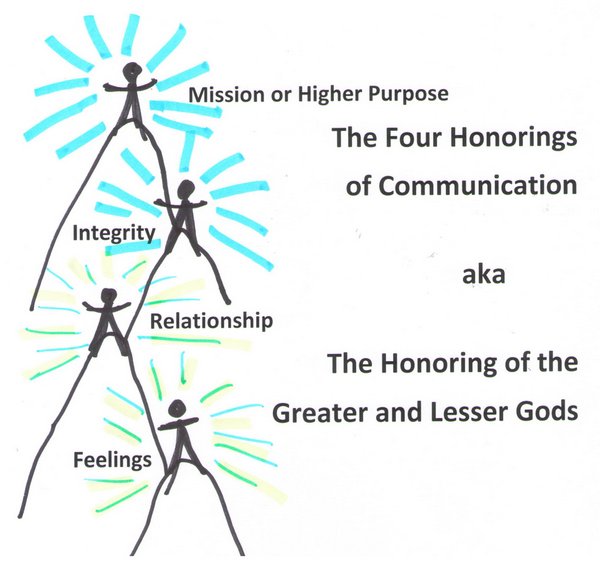9. Four Honorings of Communication - RonaldMah
Ronald Mah, M.A., Ph.D.

Licensed Marriage & Family Therapist,
Consultant/Trainer/Author
Main menu:
9. Four Honorings of Communication
Therapist Resources > Therapy Books > Mirror Mirror- Self-Esteem Relationships

Mirror Mirror… Reflections of Self-Esteem in Relationships and Therapy
Chapter 9: THE FOUR HONORINGS OF COMMUNICATION
by Ronald Mah

Sometimes, a person needs to communicate something difficult, scary, uncomfortable, dangerous, potentially embarrassing, or something else that may be experienced as threatening or humiliating to his or her partner (or, anyone he or she has a vested relationship with: colleague, friend, boss, etc.). The individual is often caught between personal integrity and honesty, and fear of potential damage. Too often, the individual doesn't know how he or she can communicate without harm, so he or she says... nothing. And, the other person stays uninformed to his or her detriment, the individual's detriment, and the relationship, couple, family, or organization's detriment. The individual remains silent filled with growing resentment, anger, and a sense of impotence. To protect the relationship, he or she stays quiet. Yet by staying silent he or she allows the relationship to accept a time-release poison that can corrupt it. The therapist frames the choice to the individual, couple, or family: either to remain silent and accept the certain pain of unresolved issues, or to speak and risk explosion. The choice to speak...to communicate becomes more viable with improved communication skills. The therapist can offer the Four Honorings of Communication as guidance. The honorings attempt to verbalize the implicit rules of the relationship. Each relationship holds implicit rules that shape the dynamics of the individual, couple, or family. Sometimes the rules are clear to all participants, partners, or family members but just as often the rules are on the periphery of consciousness. Clarifying such rules reaffirm the individuals' mutual expectations. Rather than these fundamental rules restricting communication, they are referenced as compelling the difficult communication. The therapist says,
When an individual needs to communicate something risky or uncomfortable, first communicate the Four Honorings. In order, honor: feelings, the relationship, personal integrity, and the higher purpose of intimacy as an invested partnership, couple, family, or group. The Four Honorings are:
1) the FEELINGS of the person to whom you are speaking;
It is important to honor the other person's feelings, since caring people are supposed to avoid hurting each other's feelings. This communication does not ignore the possibility of feelings being hurt.
2) the RELATIONSHIP between you and the person;
Feelings are honored but the relationship is asserted as so important that risking hurt feelings is necessary. The relationship is honored and held to a higher standard of open communication, honesty, and security versus closed communication and a superficial or fearful relationship.
3) your own INTEGRITY- your need to care for yourself;
Although feelings and the relationship are held to be of great value, individual integrity (moral virtue or the ideal self) is a higher value. At the very least, personal integrity is asserted as comparably important and not to be sacrificed to avoid sensitive feelings being hurt in order to maintain false harmony in the relationship.
4) the HIGHER PURPOSE of INTIMACY the two of you both honor and serve.While feelings, the relationship, and personal integrity are honored, intimacy as a couple is the highest value to honor.
Then the individual asks permission to speak the truth the best he or she can. "Is it OK if I tell you?" For example:
"I need to tell you something that is very difficult for me to say. I realize that it may feel hurtful or critical or make you feel uncomfortable, and your feelings are very important to me. I really don't want that to happen… and I really need to say it.I also know that if I don't say something or if I don't say it appropriately and hurt your feelings, it may harm our relationship. Our relationship is very important to me. I enjoy and value it and I want it to be an honest relationship where we can be open with each other.I need to bring this up, because I don't know how to not say it and be honest with myself. I need to talk about this to be the person and partner (family member, colleague, or ally) I want and need to be...And, if I don't bring it up, I won't be true to the reason we're here together in the first place. I need to speak up for us both to do right by ourselves and serve our shared goals.Is it ok if I tell you?"
At this point, except for an extremely insecure and defended individual (and unfortunately, there can be such a partner, family member, or associate), while nervous and apprehensive, most people will accept the communication fairly well. The therapist often sets up his or her difficult communications this way to an individual, couple, or family. The therapist model of messaging is for the individual, couple, or family to observe and experience. It can then be overtly taught to the individuals to facilitate more successful communication in the session and at home. Terry or Bert may be instructed to tell the other person sometime potentially triggering while respecting feelings, the relationship… "I realize that this might feel demeaning and make our relationship more difficult, but while respecting your feelings I want our relationship to work better. I need to and we need to be able to be upfront in this." They would be further guided to name the personal integrity and higher purpose… "I need to say this because I really believe it is important and will be best for the kids- which is what we both want."

This can be called the metaphorically, "The Honoring of the Greater and Lesser Gods." The other person's feelings are important, as are one's feelings. In the hierarchy of the Olympic gods the lesser gods are very important and to be honored. However, the lesser gods are not as important or as powerful as the greater gods. Although in Greek mythology, Aphrodite (known also as Venus in Roman mythology) and Ares (Mars) were not to be trifled with, Zeus (Jupiter) and Hera (Juno) were at the top of Mount Olympus. The therapist validates the importance of sensitivity and honoring the other person's feelings and the existing relationship as the lesser gods, while asserting the supremacy of the greater gods- personal integrity and the higher mission or purpose of a mutually productive unity attaining critical partnership, family, or group goals. Harmony, unity, genuineness, and intimacy often had been previously sacrificed in fear of hurting feelings and harming an otherwise workable yet dysfunctional relationship. By "honoring" the lesser gods, the greater gods were compromised. This resulted in issues and injuries deepening to the point of needing therapy and/or relationship corruption or termination. Partners such as Terry and Bert may have a long history of experiencing their feelings and their desired mutually respective relationship discounted. And at the same time having to compromise their integrity as parents and personally, while losing the higher mission of giving the children the best care. Keeping Terry and Bert focused on the primacy of the two "greater gods" while also proportionately honoring the "lesser gods" may help their communication and dynamics. Clients will often arrive in therapy to ask for help to heal or rebuild personal integrity and achieve the higher mission or purpose of a healthy relationship, couple, or family. Yet, they will ask overtly and implicitly that these key issues be addressed without them attempting anything different that may risk harm to one another's feelings and fragile corrupt relationships. Their communication processes often are inherently problematic, yet they may insist on perpetuating what has caused them their core dysfunction. The therapist must find a way to challenge their resistance to promote fundamental communication change- that is, to honor the greater gods while risking affronts to the lesser gods.

